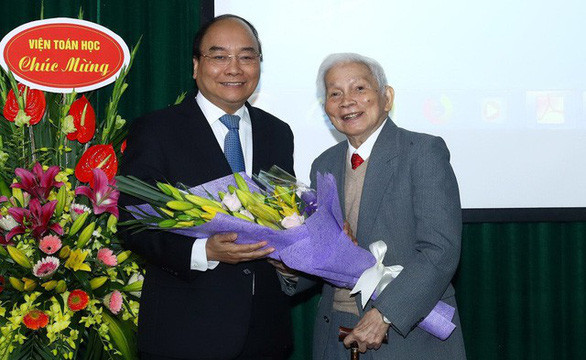Professor Hoang Tuy passed away
According to information from his family, Professor Hoang Tuy - a typical Vietnamese mathematician - passed away this afternoon, July 14.
 |
Prime Minister Nguyen Xuan Phuc presents flowers to congratulate on his 90th birthday and honor Professor Hoang Tuy, a famous Vietnamese and world mathematician with optimization algorithms (photo taken in 2017). Photo: VNA |
Along with Professor Le Van Thiem, he is one of two pioneers in building the Vietnamese Mathematics industry.
Professor Hoang Tuy is considered the father of the field of global optimization in applied mathematics.
Not only a mathematician, Professor Hoang Tuy also has many contributions to Vietnamese education. He is also the founder of the Institute for Development Studies (IDS), of which he is the Chairman of the Institute's Council.
In March 1959, Professor Hoang Tuy became one of the first two Vietnamese people to successfully defend their PhD thesis in mathematics and physics at Lomonosov University in Moscow.
From 1961 to 1968, he was head of the Mathematics Department of Hanoi University of Science; director of the Vietnam Institute of Mathematics from 1980 to 1989.
In 1964, he invented the "Tuy's cut" method and is considered the first milestone marking the birth of a new mathematical discipline: Global optimization theory.
In August 1997, on the occasion of the professor's 70th birthday, Linköping Institute of Technology (Sweden) organized an international conference with the theme "Finding optimization from local to global" to honor Professor Hoang Tuy, "who had pioneering work in the field of global optimization and general mathematical programming".
In December 2007, on the occasion of his 80th birthday, an international conference on "Nonconvex Programming" was held in Rouen, France to recognize Professor Hoang Tuy's pioneering contributions to this field in particular and to Global Optimization in general.
During the 21st century, Professor Hoang Tuy wrote a number of critical articles and gave frank comments on the weaknesses, backwardness and negativity in Vietnam's education sector as well as participated in many conferences discussing educational reform.

